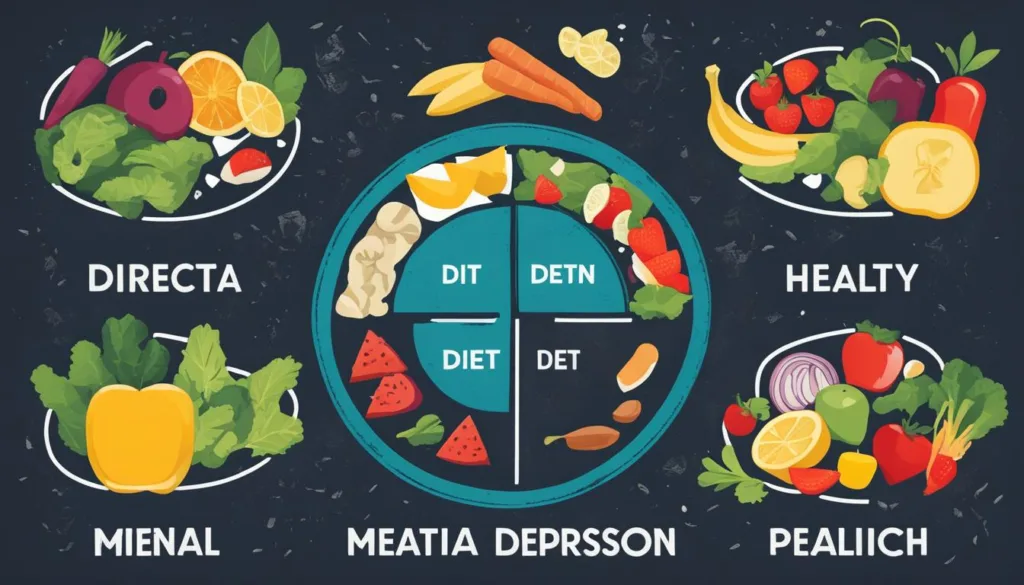When it comes to mental health, we often focus on factors like stress, genetics, and life events. However, emerging research suggests that our diet may also play a significant role in our emotional well-being. Can diets cause depression? Let’s explore the relationship between diet and depression and how our food choices can impact our mental health.
Multiple studies have examined the link between diet and mental health, specifically the association between diets and depression. A systematic review and meta-analysis published in Molecular Psychiatry revealed some interesting findings. It showed that healthy dietary patterns, including a diet rich in fruits, vegetables, whole grains, and fish, were associated with a reduced risk of depression. Conversely, unhealthy dietary patterns, such as diets high in refined sugars, processed foods, and saturated fats, were associated with an increased risk of depression.
Key Takeaways
- A link exists between diet and depression, with healthy dietary patterns reducing the risk of depression.
- Nutrients like omega-3 fatty acids, B vitamins, magnesium, zinc, and vitamin D are essential for mental well-being.
- Processed foods high in refined sugars, saturated fats, and additives may contribute to inflammation and oxidative stress, negatively affecting mental health.
- A healthy diet, featuring fruits, vegetables, whole grains, lean proteins, and essential nutrients, supports mental well-being and a positive mood.
- While diet alone may not cause depression, it can play a pivotal role in managing and preventing depressive symptoms.
As we can see, the impact of diet on mental well-being cannot be ignored. While diet alone may not be the sole cause of depression, it certainly affects our overall emotional health. Understanding the connection between food and mood allows us to make informed choices to support our mental well-being. Stay tuned for more insights on managing depression through diet and dietary strategies for improved mental health.
Link Between Diet and Depression
Research suggests a link between diet and depression, highlighting the role of diet in mental health. Healthy dietary patterns are associated with a reduced risk of depression, while unhealthy diets increase the risk.
Nutrients such as omega-3 fatty acids, B vitamins, magnesium, zinc, and vitamin D have been shown to play a role in supporting mental well-being. These nutrients can be found in various foods and supplements.
Processed foods, high in refined sugars, saturated fats, and additives, can contribute to inflammation and oxidative stress, negatively impacting mental health. Avoiding or limiting these foods is essential for improving mental well-being.
A healthy diet rich in fruits, vegetables, whole grains, lean proteins, and essential nutrients can have a positive impact on mental health. It supports overall well-being, enhances mood, and reduces the risk of depression.
To illustrate the concept visually, refer to the table below that highlights the impact of different diets on mental health.
| Diet Type | Impact on Mental Health |
|---|---|
| Healthy diet | Reduces the risk of depression |
| Unhealthy diet | Increases the risk of depression |
By adopting a balanced and nutrient-rich diet, individuals can effectively support their mental well-being and improve their overall quality of life.

In Short, “Can Diets Cause Depression”?
While diet alone may not cause depression, it can play a role in managing and preventing depressive symptoms. Making certain dietary adjustments can support mental well-being and contribute to an improved mood. Here are some strategies and nutrition tips that may help:
1. Incorporate mood-boosting foods: Focus on including foods in your diet that are known to have a positive impact on mood. For example, consuming foods rich in omega-3 fatty acids, such as fatty fish like salmon or trout, can promote brain health and improve symptoms of depression. Other foods like leafy green vegetables, berries, nuts, and whole grains contain vitamins, minerals, and antioxidants that support mental health.
2. Prioritize a balanced diet: Opt for a well-balanced diet that includes a variety of nutrient-dense foods. This means enjoying a mix of fruits, vegetables, whole grains, lean proteins, and healthy fats. Implementing portion control and avoiding excessive consumption of processed foods and sugary snacks can help stabilize blood sugar levels and maintain a stable mood.
3. Mindful eating and self-care: Pay attention to your eating habits and focus on practicing mindful eating. This involves being present and aware of the food on your plate, savoring each bite, and listening to your body’s hunger and fullness cues. Additionally, prioritize self-care activities such as regular exercise, getting enough sleep, and managing stress levels, as these factors also contribute to overall mental well-being.
Remember, while diet can be a valuable tool in managing depression, it’s important to seek professional guidance and support. A healthcare provider or registered dietitian can provide personalized recommendations and help create a dietary plan tailored to your specific needs and goals.



